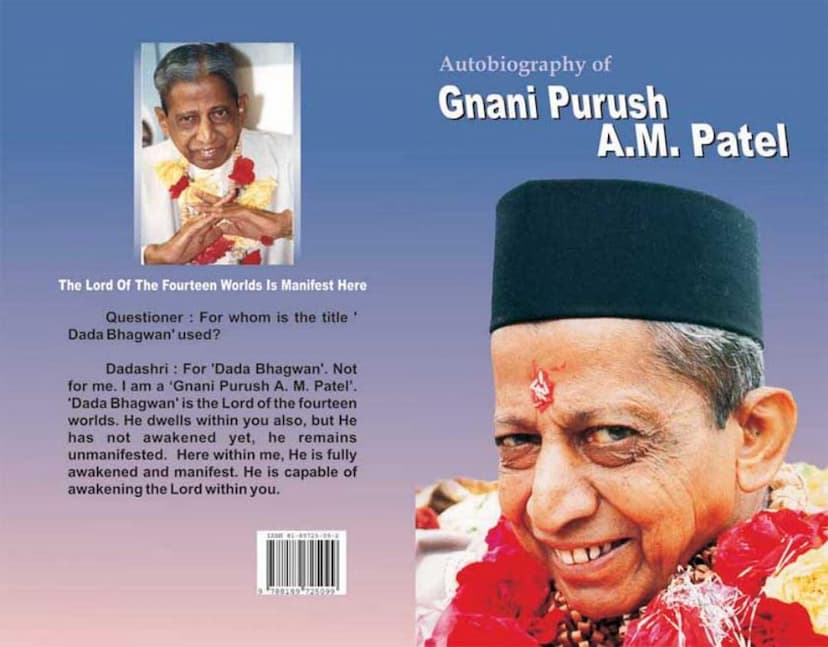Autobiograpy Of Gyani Purush A M Patel
Added to library: September 1, 2025

Summary
This document provides an excerpt from the "Autobiography of Gnani Purush A. M. Patel" by Dada Bhagwan, published by Dada Bhagwan Foundation. The book details the spiritual journey and realization of Ambalal M. Patel, who became known as Dadashri or Dada.
Here's a summary of the key themes and information presented:
1. The Nature of "Dada Bhagwan" and "Gnani Purush":
- The title "Dada Bhagwan" refers to the fully awakened Self, the "Lord of the fourteen worlds," which resides within everyone but is "manifest" and "awakened" within Ambalal Patel.
- Ambalal Patel identifies himself as a "Gnani Purush A. M. Patel," meaning a Self-realized being. He distinguishes himself from the ultimate divine entity, "Dada Bhagwan," whom he worships.
2. The Manifestation of "Akram Vignan":
- The core of the book describes a spontaneous spiritual event that occurred to Ambalal Patel on a railway platform in Surat in June 1958. This event, lasting about 48 minutes, led to his Self-realization.
- This process of instant Self-realization is termed "Akram Vignan," which is contrasted with the traditional "Kramik" or step-by-step path of spiritual development. Akram Vignan is described as a "shortcut" or "bypass" that is available for a limited time in the current era (Kaliyug).
- Akram Vignan involves the "full stop of the ego," leading to the direct purification of the ego and attainment of the Self.
3. Ambalal Patel's Spiritual Journey and Character:
- The autobiography highlights Ambalal Patel's lifelong spiritual seeking, even from childhood. He exhibited a deep desire to understand the Self and was not driven by worldly desires or material possessions.
- He demonstrated remarkable purity of intent, non-violence, and a strong sense of justice, even as a child. His mother instilled in him the importance of not hitting back and of compassion.
- He was characterized by immense pride and ego in his youth, which he later worked through. He deliberately failed his matriculation exams to avoid becoming a collector and coming under a superior.
- He was independent by nature, preferring to be his own boss rather than work for others. He also showed a consistent principle of confronting superiors and protecting subordinates.
- He was deeply introspective, contemplating the nature of the world, karma, and the Self. He studied various religious scriptures but found that his understanding came from his own direct experience and past life efforts, not from a conventional guru.
- He experienced his worldly life, including business and marriage, with a profound spiritual awareness. He managed his business with honesty and detachment and maintained harmony in his marriage by being cautious and making adjustments. He remained devoted to his wife, Hiraba, even after she lost an eye.
4. The Nature of a Gnani Purush:
- A Gnani Purush is defined as someone who possesses "constant light," is the "personification of knowledge," knows everything, and has nothing more left to know. They are free from all bondages and possess a flawless vision, seeing only the Soul in every being.
- The Gnani Purush is described as being "vitarag" (completely detached), even while engaged in worldly activities.
- His words carry power, and even though he may not have achieved "Keval Gnan" (absolute omniscience), he has attained a state beyond the knowledge of the Soul, with absolute understanding.
5. Key Principles and Practices:
- Akram Vignan: The central teaching is the path of instant Self-realization.
- Awareness of the Self: Maintaining constant awareness of the Self, even amidst worldly chaos.
- Non-violence and Compassion: A core principle evident from childhood, extending even to insects.
- No Ego, No Attachment: The ultimate goal is the dissolution of the ego and the cessation of attachments.
- Pratikraman: A process of acknowledging mistakes, seeking forgiveness, and vowing not to repeat them, performed with Dada Bhagwan as a witness.
- Vyavasthit (Scientific, Circmstantial Evidence): An understanding that everything happens according to a precise cosmic law.
- Living as a "Nimit" (Instrument): Acting as an instrument of the Divine, free from self-will and personal desires.
In essence, the autobiography offers a profound insight into the life and teachings of A. M. Patel, revealing his extraordinary spiritual transformation and the dissemination of "Akram Vignan," a revolutionary path to immediate Self-realization and liberation.